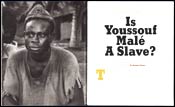
His methods were, to say the least, unorthodox, and far from Timesian: spending hours with sources without a notebook, writing epic-length articles with barely a quotation in them. But Michael Finkel knew how to tell a story, and he told some great ones for The New York Times Magazine – until last week, in an unprecedented editors’ note, the paper revealed that the title character of his November 18 story, “Is Youssouf Malé a Slave?,” was actually a composite of several young men. Finkel, 33, was fired, leaving some to wonder if the Times had been too taken with his (too-hard-to-check) articles from such far-flung locales as the Ivory Coast, Gaza, and Haiti, where he famously had to be rescued from a refugee boat.
Reached at home in Montana, Finkel is shaky and glum (“My career is on the line,” he says) and, yes, defiant, casting himself less as a Stephen Glass master of invention than as an overreaching artist who dared to touch the sun and got singed. “It’s an isolated incident, without question a wrong decision,” he says. “I hope readers know that this was an attempt to reach higher – to make something beautiful, frankly. In the article, there’s no question of the quality of reporting, just in the journalistic techniques employed.”
How can the quality and the accuracy be unrelated? “In my writing,” Finkel explains, “I try to combine all my favorite elements of journalism – accuracy, real characters that exist on this planet – with all my favorite elements of literature: a sense of flow, of propulsion, of wanting to read every sentence.” This time, though, literary seemed to trump journalism. “Look, I wrote a 6,000-word story without a single quote, without a blink in the shift of tone and pace. It was an ambitious attempt. I slipped. It deserved a correction. But there is a great deal of accuracy. Not once has the prose been called into question.”
He’s prepared to fall on his sword – “The magazine had to do what they had to do. I would have done it to myself” – but he’s not about to forget what he did for them. “I put my life on the line for the Times – off of Haiti, in the line of fire in Gaza, in Afghanistan.” His own story, he says, is just beginning. “Not to get too maudlin, but I think all mistakes are tests for one’s mettle.
“I am a writer. It’s like a third arm to me. My first reaction to all of this was to write about it. I’ve filled up pages in my journal about it. I’m going to write about you.”